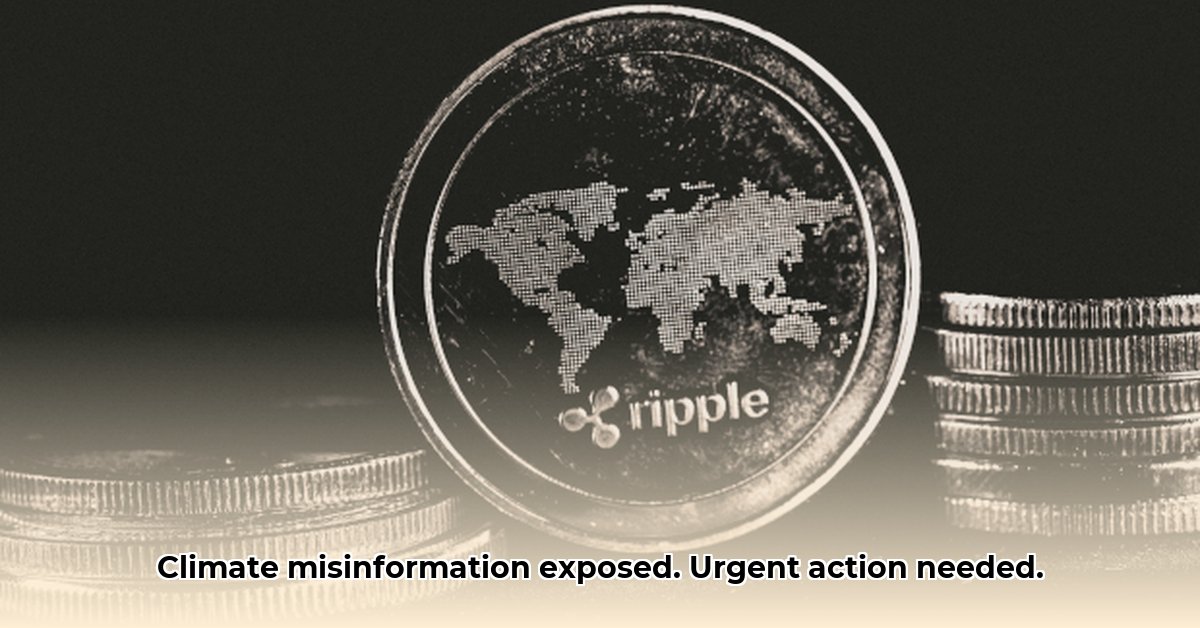
Ripple Research: Exposing the Strategic Spread of Climate Disinformation
Ripple Research's latest report, "Ripple Research Unmasks Climate Misinformation," reveals a disturbing trend: a sophisticated campaign is actively disseminating false information about climate change, hindering efforts to mitigate its effects. This isn't simply the spread of isolated inaccuracies; it's a strategic effort to confuse the public and impede progress on climate policies. The campaign employs advanced tactics, often leveraging subtle psychological manipulation to cast doubt on climate science and dissuade action. This misinformation war uses carefully crafted narratives to portray climate solutions as economically unfeasible, ineffective, or even a threat to personal liberties.
Subversive Tactics: Exploiting Gender and Freedom
One particularly insidious tactic involves manipulating gender roles and appealing to anxieties about government overreach. For instance, climate-conscious dietary choices are often derided using terms like "soy boys," attempting to link environmental responsibility with perceived masculinity loss. Simultaneously, climate policies are portrayed as infringements on individual freedoms, playing on deeply held values to create resistance to necessary changes. This targeted approach subtly undermines support for climate action by associating it with negative social or political connotations.
Beyond the Obvious: Misinformation’s New Hiding Places
The spread of this misinformation isn't confined to fringe websites. Ripple Research's findings highlight its presence on seemingly credible platforms like LinkedIn, a concerning development. This underscores the importance of critical evaluation of online information regardless of the source's apparent authority. The pervasiveness of this campaign requires heightened awareness and vigilance in discerning accurate information from deliberate falsehoods.
Ripple Research's Data: A Clear Pattern Emerges
Ripple Research's analysis demonstrates a clear correlation between the proliferation of climate misinformation and a decrease in public support for climate action. The report also identifies a notable surge in pro-China sentiment surrounding climate technology advancements around early 2025, suggesting a possible coordinated international effort to undermine Western climate initiatives. While causality can't be definitively established, the compelling connection warrants further investigation and immediate action. The data paints a worrying picture of a strategic disinformation campaign actively undermining crucial climate efforts.
Combating the Tide: A Unified Strategy for Action
Countering this coordinated misinformation campaign requires a multifaceted strategy involving governments, social media companies, educators, and individuals. The following provides a framework for effective action:
Government Action: Governments should fund public education programs focusing on media literacy and critical thinking skills to empower citizens to identify and resist misinformation. Simultaneously, investment in robust fact-checking initiatives and legislation to regulate the spread of harmful online content is crucial.
Social Media Responsibility: Social media platforms must enhance their algorithms to detect and remove climate misinformation proactively. This includes increased investment in AI-powered detection tools and collaboration with independent fact-checkers to ensure accuracy and accountability.
Educational Initiatives: Schools and universities must incorporate media literacy and critical thinking into their curricula, equipping future generations with the skills needed to navigate the complex landscape of online information. This includes fostering a culture of responsible information consumption and skepticism of unsubstantiated claims.
Collaborative Efforts: Non-profit organizations, researchers, and media outlets must work collaboratively to create and disseminate accurate information, counter false narratives, and support the development of effective strategies for combating misinformation. Active engagement in online forums and direct confrontation of misleading claims are key elements of this approach.
Confronting the Challenges: Potential Roadblocks and Mitigation Strategies
Effective action requires acknowledging and addressing the inherent complexities, including the risks of biased algorithms, public distrust of institutions, evolving misinformation tactics, resource limitations, and the divisive political climate surrounding climate change. Addressing these challenges requires:
Addressing Algorithm Bias: Regular audits of social media algorithms and transparent design principles are crucial to ensure fairness and prevent the amplification of false narratives. Utilizing diverse training datasets is critical for improved accuracy in identification of misleading information.
Building Public Trust: Transparency, open communication, and collaboration between various stakeholders are vital for rebuilding public trust in institutions and creating a more resilient information ecosystem.
Adapting to Evolving Tactics: Continuous monitoring and research are crucial for staying ahead of evolving misinformation strategies and developing effective countermeasures. This includes adapting to different communication channels and methodologies.
Securing Resources: Investing in research, education, and technology is essential for developing and implementing effective responses to the ever-growing threat of climate misinformation. This requires securing dedicated funding and strategic allocation of resources.
Bridging Political Divides: Focus on non-partisan education and communication strategies that appeal to common values and shared concerns. This necessitates tailoring messaging to resonate with diverse audiences and perspectives.
The fight against climate misinformation requires a sustained, collective effort. Ripple Research’s findings provide critical data; now decisive action is needed to protect the future. The challenge is substantial, but by working together, we can build a more informed and resilient society prepared to address the urgent threat of climate change.